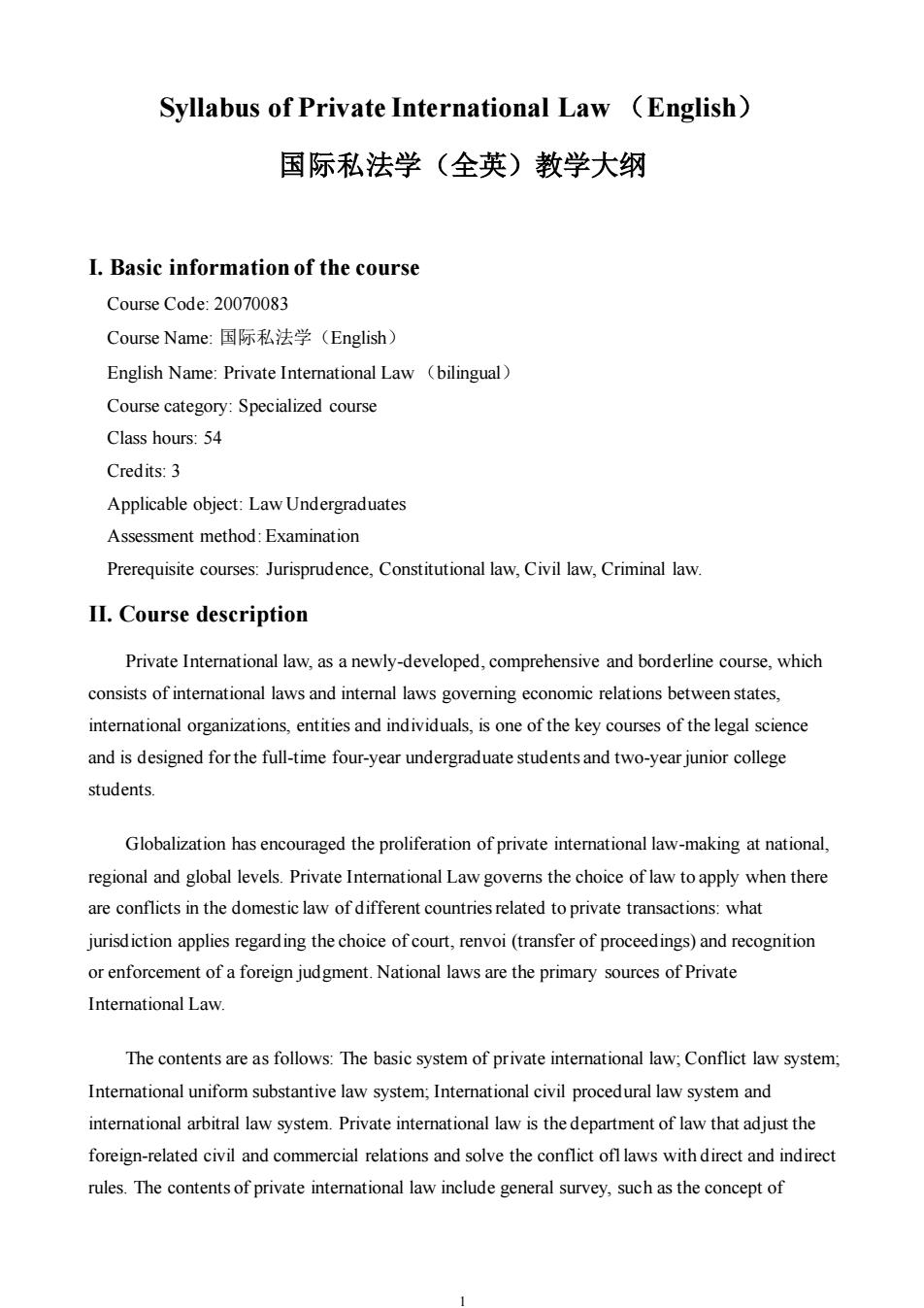
Syllabus of Private International Law (English) 国际私法学(全英)教学大纲 I.Basic information of the course Course Code:20070083 Course Name::国际私法学(English) English Name:Private International Law (bilingual) Course category:Specialized course Class hours:54 Credits:3 Applicable object:Law Undergraduates Assessment method:Examination Prerequisite courses:Jurisprudence,Constitutional law,Civil law,Criminal law II.Course description Private Intemational law,as a newly-developed,comprehensive and borderline course,which consists of international laws and intemal laws govering economic relations between states. intemational organizations,entities and individuals,is one of the key courses of the legal scienc and is designed for the full-time four-year undergraduate students and two-year junior college students. Globalization has encouraged the proliferation of private international law-making at national, regional and global levels.Private International Law governs the choice of law to apply when there are conflicts in the domestic law of different countries related to private transactions:what jurisdiction applies regarding the choice of court,renvoi (transfer of proceedings)and recognition or enforcement of a foreign judgment.National laws are the primary sources of Private The contents are as follows:The basic system of private intemational law,Conflict law system Intemational uniform substantive law system:Intemational civil procedural law system and interational arbitral law system.Private intemational law is the department of law that adjust the foreign-related civil and commercial relations and solve the conflict ofl laws withdirect and indirect rules.The contents of private international law include general survey,such as the concept of
1 Syllabus of Private International Law (English) 国际私法学(全英)教学大纲 I. Basic information of the course Course Code: 20070083 Course Name: 国际私法学(English) English Name: Private International Law (bilingual) Course category: Specialized course Class hours: 54 Credits: 3 Applicable object: Law Undergraduates Assessment method: Examination Prerequisite courses: Jurisprudence, Constitutional law, Civil law, Criminal law. II. Course description Private International law, as a newly-developed, comprehensive and borderline course, which consists of international laws and internal laws governing economic relations between states, international organizations, entities and individuals, is one of the key courses of the legal science and is designed for the full-time four-year undergraduate students and two-year junior college students. Globalization has encouraged the proliferation of private international law-making at national, regional and global levels. Private International Law governs the choice of law to apply when there are conflicts in the domestic law of different countries related to private transactions: what jurisdiction applies regarding the choice of court, renvoi (transfer of proceedings) and recognition or enforcement of a foreign judgment. National laws are the primary sources of Private International Law. The contents are as follows: The basic system of private international law; Conflict law system; International uniform substantive law system; International civil procedural law system and international arbitral law system. Private international law is the department of law that adjust the foreign-related civil and commercial relations and solve the conflict ofl laws with direct and indirect rules. The contents of private international law include general survey, such as the concept of
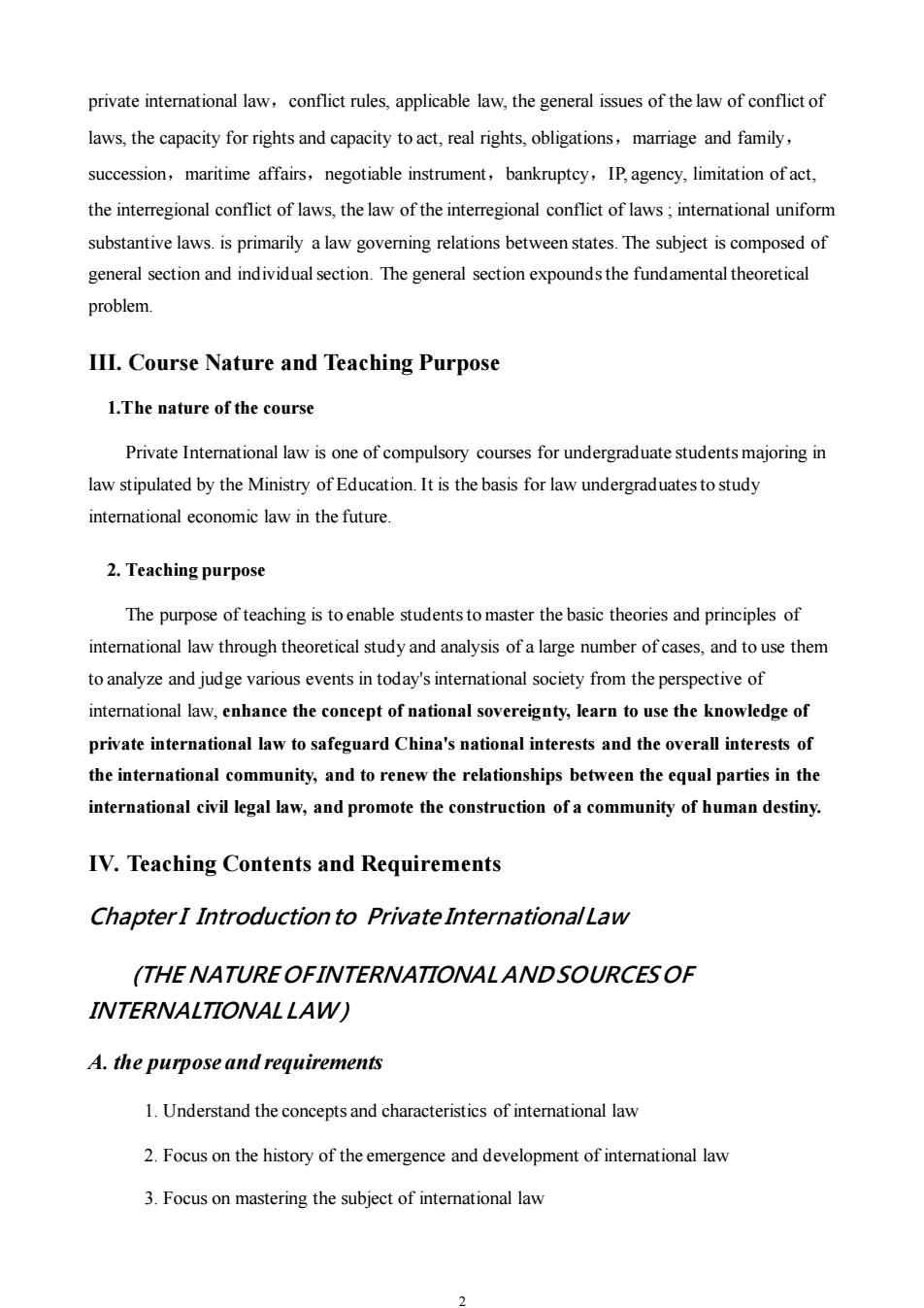
private international law,conflict rules,applicable law,the general issues of the law of conflict of laws,the capacity for rights and capacity to act,real rights,obligations,marriage and family, succession,maritime affairs,negotiable instrument,bankruptcy,IPagency,limitation of act the interregional conflict of laws,the law of the interregional conflict of laws;international uniform substantive laws.is primarily a law governing relations between states.The subject is composed of general section and individual section.The general section expounds the fundamental theoretical problem III.Course Nature and Teaching Purpose 1.The nature of the course Private International law is one of compulsory courses for undergraduate students majoring in law stipulated by the Ministry of Education.It is the basis for law undergraduatestostudy international economic law in the future. 2.Teaching purpose The purpose of teaching is toenable studentstomaster the basic theories and principles of international law through theoretical study and analysis of a large number of cases,and to use them to analyze and judge various events in today's interational society from the perspective of international law,enhance the concept of national sovereignty,learn to use the knowledge of private international law to safeguard China's national interests and the overall interests of the international community,and to renew the relationships between the equal parties in the international civil legal law,and promote the construction of a community of human destiny. IV.Teaching Contents and Requirements ChapterI Introduction to Private InternationalLaw (THE NATURE OFINTERNATIONAL ANDSOURCESOF INTERNALTTONAL LAW) A.the purpose and requirements 1.Understand the concepts and characteristics of international law 2.Focus on the history of the emergence and development of international law 3.Focus on mastering the subject of international law
2 private international law,conflict rules, applicable law, the general issues of the law of conflict of laws, the capacity for rights and capacity to act, real rights, obligations,marriage and family, succession,maritime affairs,negotiable instrument,bankruptcy,IP, agency, limitation of act, the interregional conflict of laws, the law of the interregional conflict of laws ; international uniform substantive laws. is primarily a law governing relations between states. The subject is composed of general section and individual section. The general section expounds the fundamental theoretical problem. III. Course Nature and Teaching Purpose 1.The nature of the course Private International law is one of compulsory courses for undergraduate students majoring in law stipulated by the Ministry of Education. It is the basis for law undergraduates to study international economic law in the future. 2. Teaching purpose The purpose of teaching is to enable students to master the basic theories and principles of international law through theoretical study and analysis of a large number of cases, and to use them to analyze and judge various events in today's international society from the perspective of international law, enhance the concept of national sovereignty, learn to use the knowledge of private international law to safeguard China's national interests and the overall interests of the international community, and to renew the relationships between the equal parties in the international civil legal law, and promote the construction of a community of human destiny. IV. Teaching Contents and Requirements Chapter I Introduction to Private International Law (THE NATURE OF INTERNATIONAL AND SOURCES OF INTERNALTIONAL LAW ) A. the purpose and requirements 1. Understand the concepts and characteristics of international law 2. Focus on the history of the emergence and development of international law 3. Focus on mastering the subject of international law
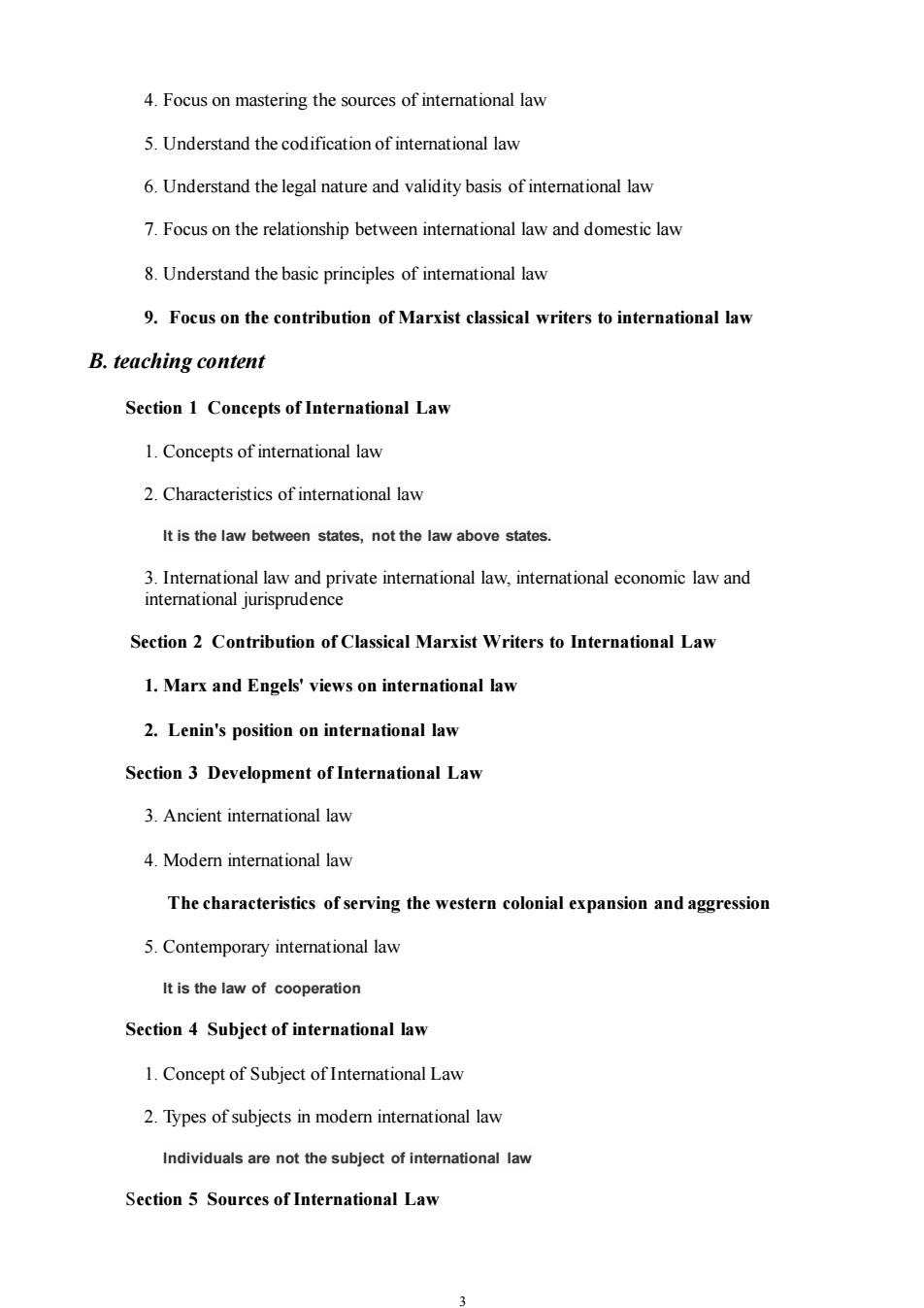
4.Focus on mastering the sources of international law 5.Understand the codification of international law 6.Understand the legal nature and validity basis of intemational law 7.Focus on the relationship between intemational law and domestic law 8.Understand the basic principles of intemational law 9.Focus on the contribution of Marxist classical writers to international law B.teaching content Section 1 Concepts of International Law 1.Concepts of international law 2.Characteristics of interational law It is the law between states,not the law above states 3.International law and private international law,international economic law and international jurisprudence Section 2 Contribution of Classical Marxist Writers to International Law 1.Marx and Engels'views on international law 2.Lenin's position on international law Section 3 Development of International Law 3.Ancient interational law 4.Modem international law The characteristics of serving the western colonial expansion and aggression 5.Contemporary international law It is the law of cooperation Section 4 Subject of international law 1.Concept of Subject of International Law 2.Types of subjects in modern intemational law Individuals are not the subject of international lav Section 5 Sources of International Law
3 4. Focus on mastering the sources of international law 5. Understand the codification of international law 6. Understand the legal nature and validity basis of international law 7. Focus on the relationship between international law and domestic law 8. Understand the basic principles of international law 9. Focus on the contribution of Marxist classical writers to international law B. teaching content Section 1 Concepts of International Law 1. Concepts of international law 2. Characteristics of international law It is the law between states, not the law above states. 3. International law and private international law, international economic law and international jurisprudence Section 2 Contribution of Classical Marxist Writers to International Law 1. Marx and Engels' views on international law 2. Lenin's position on international law Section 3 Development of International Law 3. Ancient international law 4. Modern international law The characteristics of serving the western colonial expansion and aggression 5. Contemporary international law It is the law of cooperation Section 4 Subject of international law 1. Concept of Subject of International Law 2. Types of subjects in modern international law Individuals are not the subject of international law Section 5 Sources of International Law
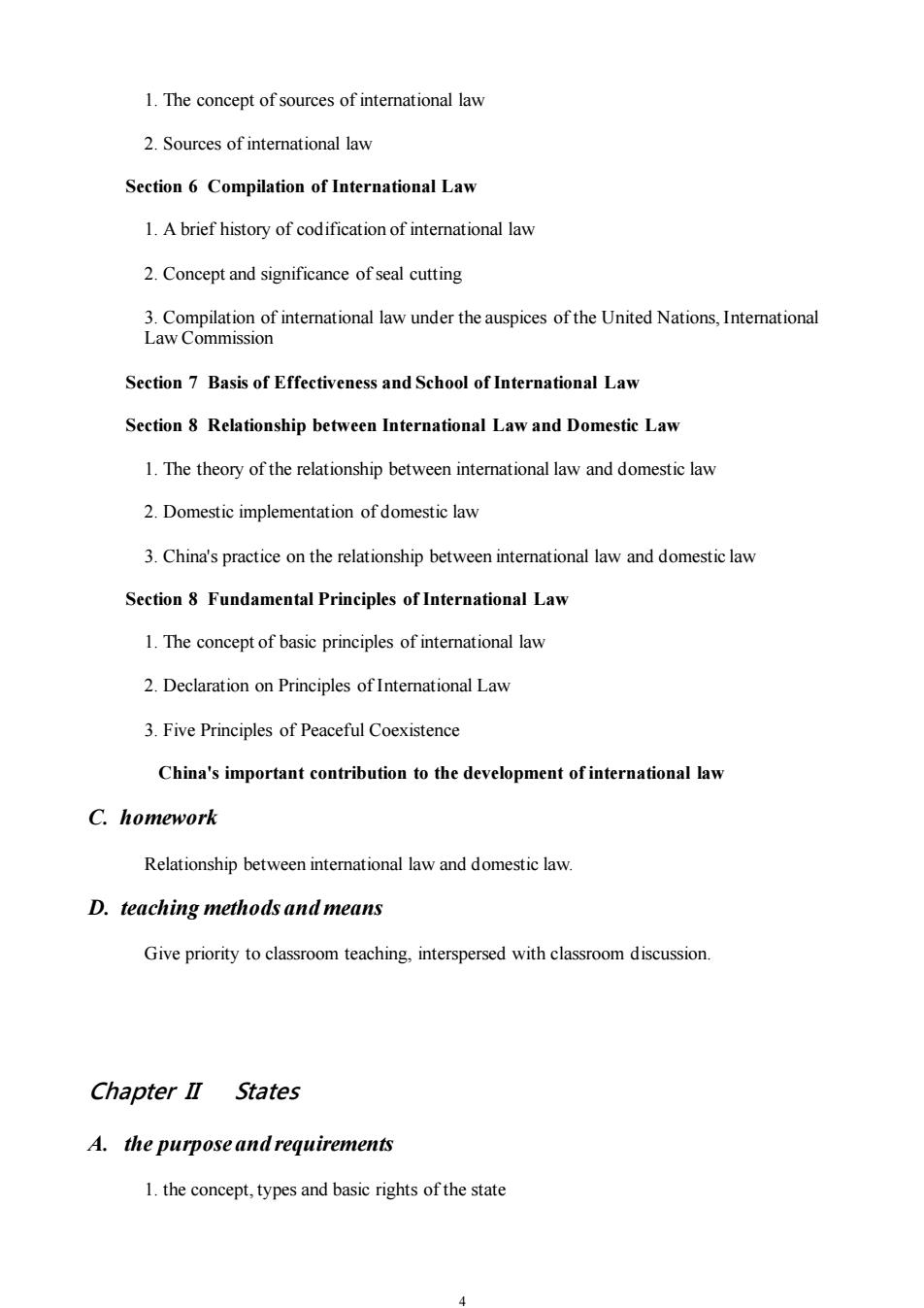
1.The concept of sources of international law 2.Sources of international law Section 6 Compilation of International Law 1.A brief history of codification of international law 2.Concept and significance of seal cutting Section 7 Basis of Effectiveness and School of International Law Section 8 Relationship between International law and Domestic law 1.The theory of the relationship between international law and domestic law 2.Domestic implementation of domestic law 3.China's practice on the relationship between international law and domestic law Section 8 Fundamental Principles of International Law 1.The concept of basic principles of intemational law 2.Declaration on Principles of International Law 3.Five Principles of Peaceful Coexistence China's important contribution to the development of international law C.homework Relationship between interational law and domestic law. D.teaching methods and means Give priority to classroom teaching.interspersed with classroom discussion. ChapterⅡStates A.the purpose and requirements 1.the concept,types and basic rights of the state
4 1. The concept of sources of international law 2. Sources of international law Section 6 Compilation of International Law 1. A brief history of codification of international law 2. Concept and significance of seal cutting 3. Compilation of international law under the auspices of the United Nations, International Law Commission Section 7 Basis of Effectiveness and School of International Law Section 8 Relationship between International Law and Domestic Law 1. The theory of the relationship between international law and domestic law 2. Domestic implementation of domestic law 3. China's practice on the relationship between international law and domestic law Section 8 Fundamental Principles of International Law 1. The concept of basic principles of international law 2. Declaration on Principles of International Law 3. Five Principles of Peaceful Coexistence China's important contribution to the development of international law C. homework Relationship between international law and domestic law. D. teaching methods and means Give priority to classroom teaching, interspersed with classroom discussion. Chapter II States A. the purpose and requirements 1. the concept, types and basic rights of the state
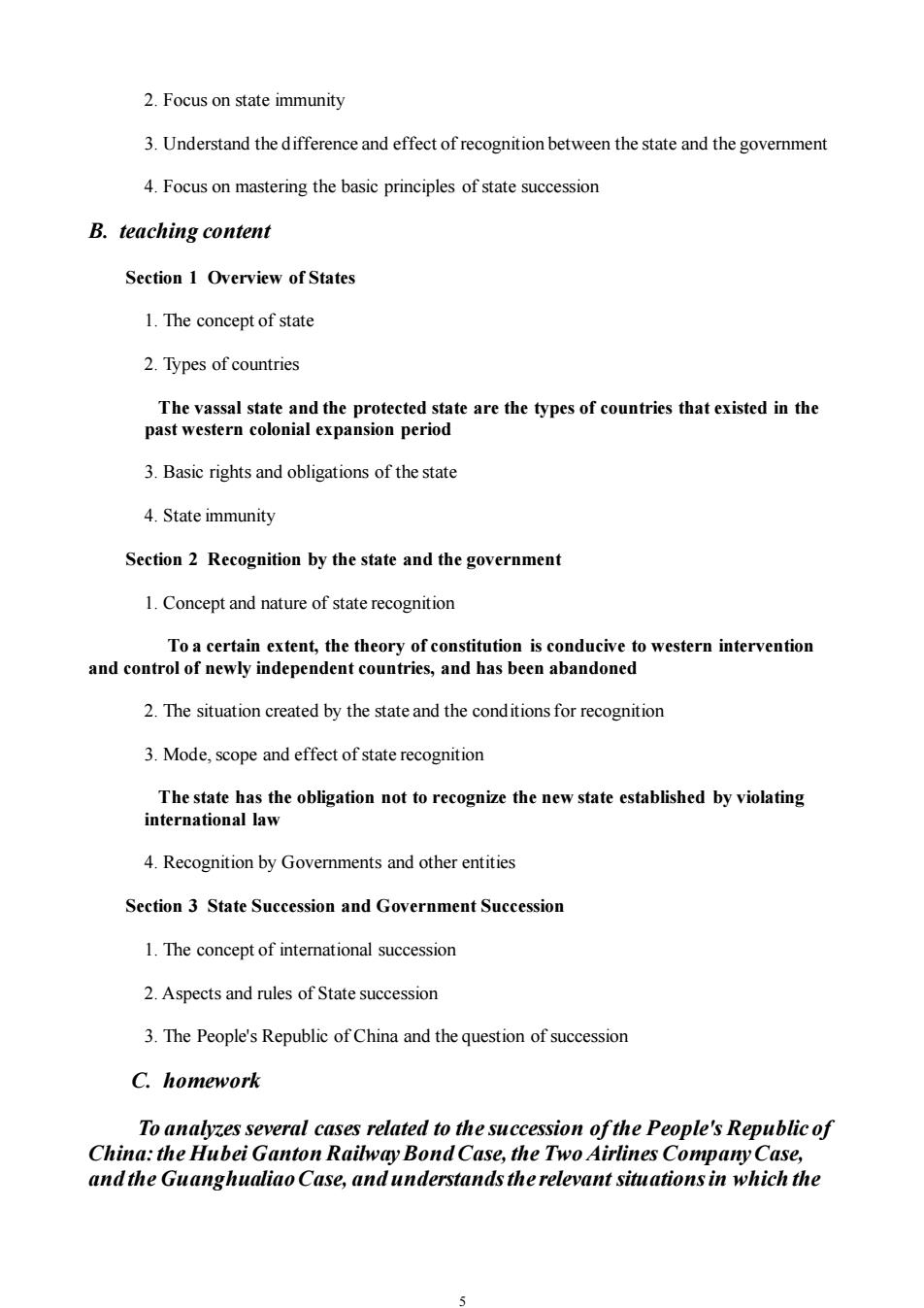
2.Focus on state immunity 3.Understand the difference and effect of recognition between the state and the government 4.Focus on mastering the basic principles of state succession B.teaching content Section 1 Overview of States 1.The concept of state 2.Types of countries The vassal state and the protected state are the types of countries that existed in the past western colonial expansion period 3.Basic rights and obligations of the state 4.State immunity Section 2 Recognition by the state and the government 1.Concept and nature of state recognition To a certain extent,the theory of constitution is conducive to western intervention and control of newly independent countries,and has been abandoned 2.The situation created by the state and the conditions for recognition 3.Mode,scope and effect of state recognition The state has the obligation not to recognize the new state established by violating international law 4.Recognition by Governments and other entities Section 3 State Succession and Government Succession 1.The concept of interational succession 2.Aspects and rules of State succession 3.The People's Republic of China and the question of successior C.homework To analyzes several cases related to the succession ofthe People's Republic of China:the Hubei Ganton Railway Bond Case,the Two Airlines Company Case, and the Guanghualiao Case,and understands the relevant situations in which the
5 2. Focus on state immunity 3. Understand the difference and effect of recognition between the state and the government 4. Focus on mastering the basic principles of state succession B. teaching content Section 1 Overview of States 1. The concept of state 2. Types of countries The vassal state and the protected state are the types of countries that existed in the past western colonial expansion period 3. Basic rights and obligations of the state 4. State immunity Section 2 Recognition by the state and the government 1. Concept and nature of state recognition To a certain extent, the theory of constitution is conducive to western intervention and control of newly independent countries, and has been abandoned 2. The situation created by the state and the conditions for recognition 3. Mode, scope and effect of state recognition The state has the obligation not to recognize the new state established by violating international law 4. Recognition by Governments and other entities Section 3 State Succession and Government Succession 1. The concept of international succession 2. Aspects and rules of State succession 3. The People's Republic of China and the question of succession C. homework To analyzes several cases related to the succession of the People's Republic of China: the Hubei Ganton Railway Bond Case, the Two Airlines Company Case, and the Guanghualiao Case, and understands the relevant situations in which the